#Scotch-Irish
Text

Reference, info, etc.
Acc. to Grant, between 1713 and 1775 more than a quarter of a million Ulster Scots and their kinfolk from the Scottish Lowlands migrated to America and became known as the Scotch-Irish. (p. 121).
2 notes
·
View notes
Text
TEHYA: Illuminating the Alt-Pop Scene with "crowd pleaser"
Introducing TEHYA, the prodigious 23-year-old singer-songwriter, producer, and multi-instrumentalist whose debut track “crowd pleaser” is set to captivate audiences worldwide. Hailing from the vibrant music scenes of LA via Seattle, TEHYA emerges as a formidable force in the alt-pop realm, marking her arrival on the esteemed Neon Gold Records alongside luminaries like Charli XCX and Tove…

View On WordPress
#alt-pop#Cherokee#crowd pleaser#debut track#DIY#emerging artist#Female Musicians#Filipino#indie#LA#multi-instrumentalist#Music#Neon Gold Records#producer#Scotch-Irish#Seattle#singer-songwriter#TEHYA
0 notes
Text
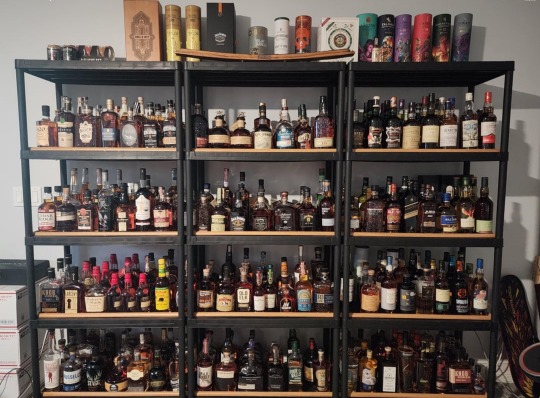
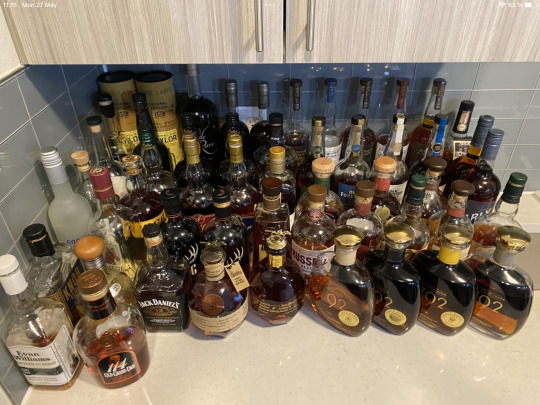

People post photos of their whiskey bars
#Whiskey#bourbon#scotch#irish whiskey#japanese whisky#gin#cocktails#mixology#drinks#old fashioned#alcohol#rum#dram#tequila#vodka#singlemalt#liquor#scotch whisky#johnny walker#macallan#ballentine#whiskey bar#alabama song
65 notes
·
View notes
Text
“I seem to have walked right into the thick of a dime novel,” said our visitor. “Why in thunder should anyone follow or watch me?”
Victorian British authors writing American characters will never ever get old
#i love how many times in this chapter Sir Henry says ‘what in thunder?’ alone#also almost said ‘english author’ and gasped in horror. ACD is proud scotch-irish#letters from watson#hound of the baskervilles
35 notes
·
View notes
Text
We had a month's training in Boise, Idaho, a month in Wendover, Utah, and a month in Sioux City, lowa. Either because our training was inadequate or because I was not fitted for the job, I had little reason to develop confidence about my ability as a navigator. On Christmas Eve, 1942, our plane took off from Wendover, Utah, the weather closed in, our gas ran out, and we crash-landed in the snowy mountains of western Wyoming. No one was hurt, testimony to the high skill of John Brady.
When a woman saw the smashed plane, she asked, "Which of you is the Scot?"
"I am Scotch-Irish," I said. "Will that do?"
"Yes," she said. "Scots are lucky. That's why none of you got killed.”
Later she gave me a sprig of Scotch heather and said, "Keep this and you will always be lucky."
I wish that the woman-her husband was vice president of the bank of Evanston, Wyoming-gave the rest of the crew a good luck charm.
— Harry Crosby in his memoir, A Wing and a Prayer
#WAIT THAT LAST LINE CROZ NOOOOO 💀💀💀#new meaning to ‘it’s all luck’#maybe Harry Crosby really is just… lucky?#he kept that scotch heather with him for the rest of the war#also there’s a sad joke about ‘makes sense that Curt was Irish and not Scottish then’#He and Curt can be Irish besties lol#it’s also funny that both actors are Irish#the real Curtis Biddick was from Wisconsin btw but idk if he was of Irish descent#masters of the air#mota#mota musings#a wing and a prayer#quotes#Harry Crosby#john brady#real mota
45 notes
·
View notes
Text
Dungeon Meshi Ch14- The Kelpie, when you were a mythology kid
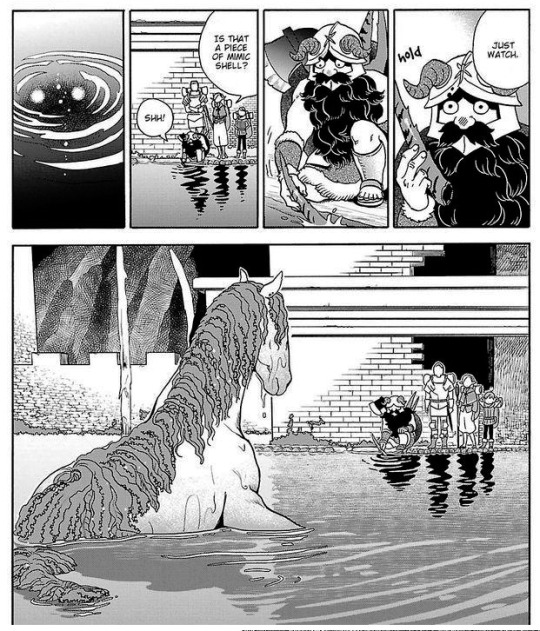
"That's a Kelpie."

"No, she's not, that's a kelpie, kelpies are ravenous beasts. Stop whatever you're doing, Senshi."

"Yes, they're omnivores that lure people onto their backs, drown them, and eat them."

"Senshi, no. That is exactly what a Kelpie wants someone to do so it can eat them. You will get eaten."
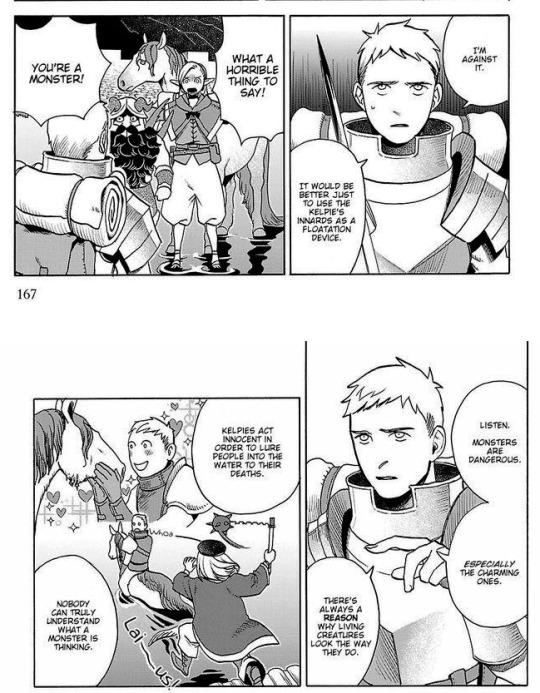
"Listen to the boy! When the monsterfetishistlover thinks its a bad idea, the man who reads about monsters in his free time, it's a bad idea."
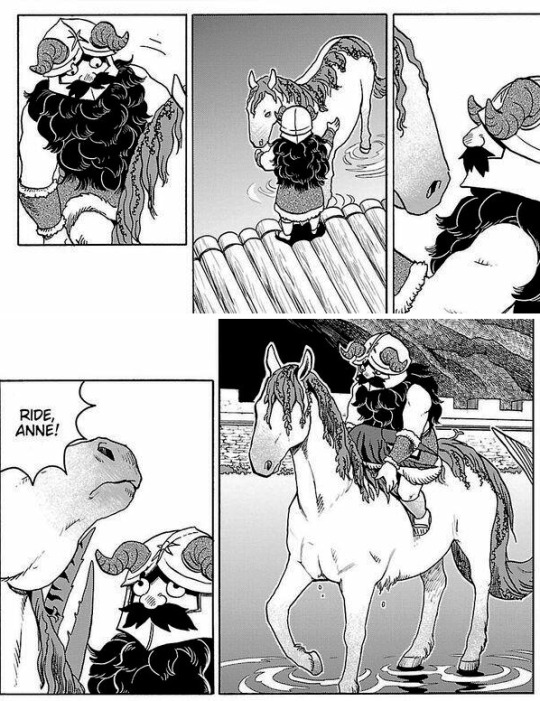
"Senshi. Stop. Get off while you can. If you can. You're an idiot. Fucking stop this idiocy."

"Get that fucking shocked look off your face, Senshi, this is what kelpies do. You literally did this to yourself. Because you're an idiot."
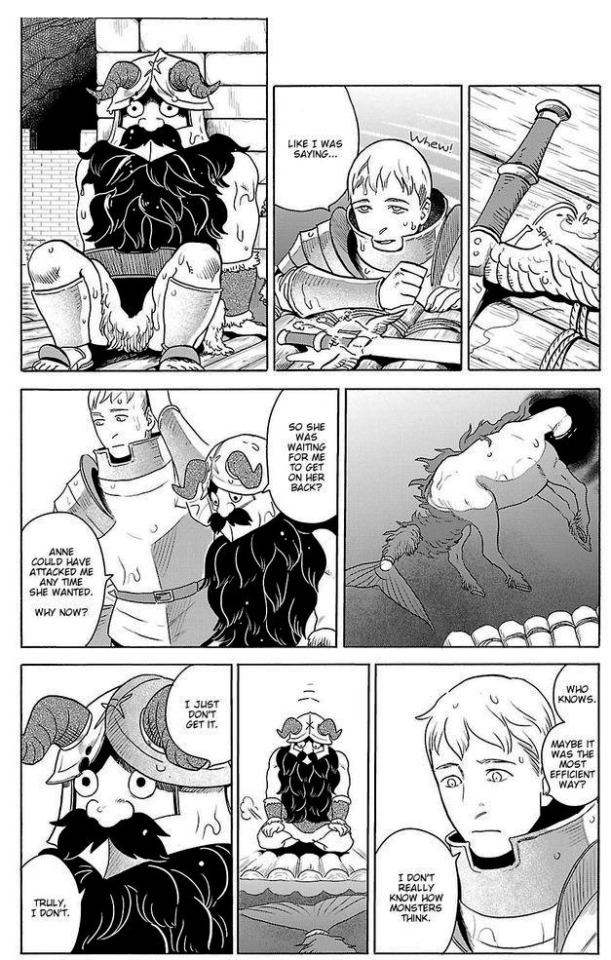
"SENSHI. THAT'S JUST WHAT KELPIES DO. THEY'RE NOT MAGICAL WATER HORSES, THEY'RE SHAPECHANGING MONSTERS THAT TAKE ON THE FORM OF A HORSE TO LURE DRUNKEN IDIOTS ONTO THEIR BACKS. THIS IS LIKE SAYING 'I DON'T UNDERSTAND WHY THAT DRAGON BURNED DOWN A VILLAGE AND TOOK OUR SHEEP.' IT'S WHAT THEY DO. YOU'RE LUCKY YOUR PARTY DIDN'T CONSIDER YOUR DEATH TO BE THE JUST CONSEQUENCE OF YOUR IDIOCY, AND SAVED YOU."
#dungeon meshi#delicious in dungeon#Senshi#Anne#Kelpies#Mythology#The only kind of character who should be considering a kelpie as a reasonable mount is another water-based monster#Like if a selkie wanted to ride a kelpie then sure. I could see that working#But not a dwarf#dwarves are known for being drunken#dwarves already have trouble with water due to their density#The only way a dwarf could be more The Natural Prey of Kelpies is if they typically had Irish Brogues instead of vague scotch/norse accents#Motion that the story of the scorpion and frog be replaced by the story of Senshi and the Kelpie
41 notes
·
View notes
Note
what's appalachia? i'm not american
appalachia is an american geographic and cultural region in and around the appalachian mountains on the east coast! The region has a very distinct culture because of how isolated it was from the rest of the country for a very long time (both because it’s very rural and because the region’s been exploited and kept in poverty for centuries by the logging and coal mining industries) and there are a lot of different cultures that make up the broader appalachian one. Like appalachian music is one of the biggest influences from there and it’s a fusion of african-american blues traditions, english folk songs, and scotch-irish fiddle.
A lot of things that people think of when they think of “American culture” (log cabins, banjo/country/folk music, evangelism, rednecks, moonshine, etc) came out of appalachia. It gets negatively stereotyped a lot most of which comes out of classism because of the whole generational poverty thing but it is a beautiful and complicated place. i went to college in the foothills which was a very cool place to be. look at my mountains aren’t they beautiful
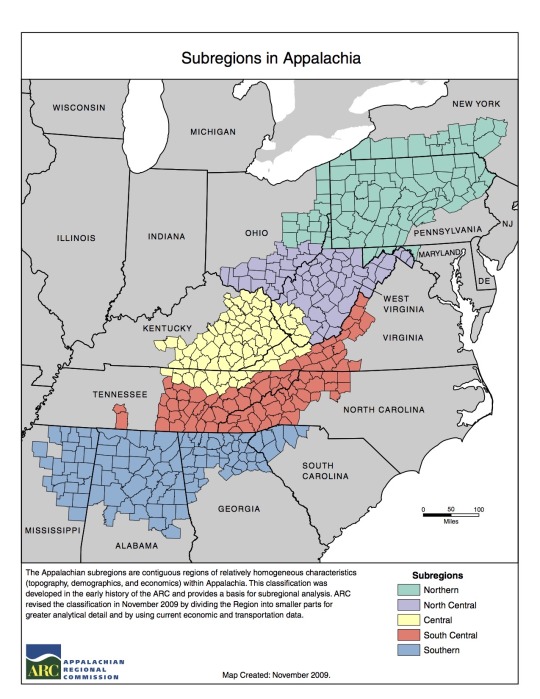
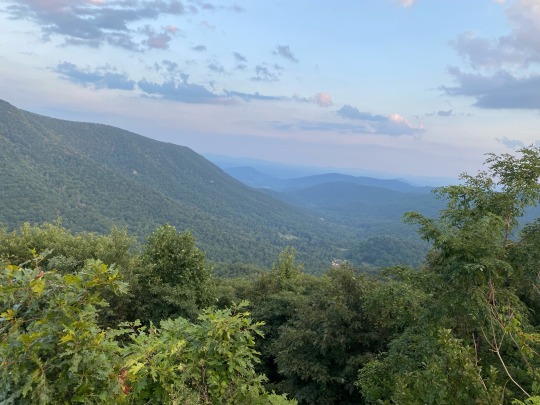
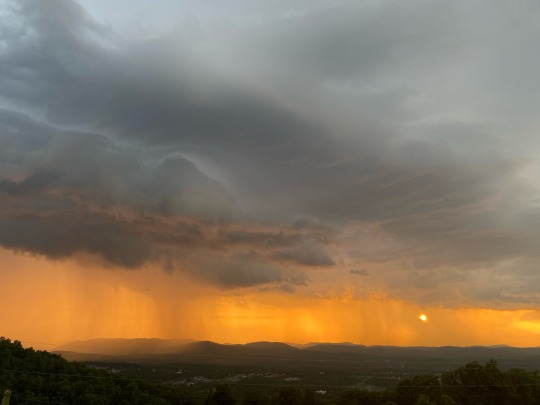
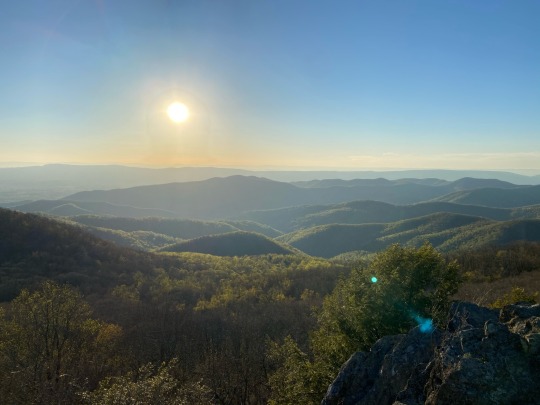
#i love it there. most beautiful place on earth fr#some of my family is also from there. welsh coal mining diaspora lets go#also scotch-irish isn’t scottish or irish it’s a secret third thing that exists only in the US nkw
118 notes
·
View notes
Text

#uquiz#tape#grip tape#masking tape#double sided tape#gaffers tape#electrical tape#btw electrical tape is great for when shoes get really worn down#if you ever wear character shoes as dress shoes too many times so the soles become too slippy just use electrical tape on the soles#learned that from irish dance (tape is used on the bottom of hard shoes)#also works pretty well on pointe shoes when the floor is too slippery but you cant use rosin and duct tape is too sticky#duct tape#duck tape#lol#scotch tape#gorilla tape#packing tape#yes i just listed all of those shut up its not nearly as many as i did for the ghibli quiz
65 notes
·
View notes
Text
i would commit unspeakably reprehensible crimes for some beef stew rn
#post#the majority of my genetic background is german and scotch-irish. keeping me away from stew for an extended period of time is animal abuse#i was born for the stew
6 notes
·
View notes
Text
I think Ellen Greene is supposed to be Irish- The "I says, says I" thing is common with Irish English speakers. She's also The Help, and both Emily and her father treat her with disdain. Explains a lot, doesn't it.
#emily is the good anglo-scotch-canadian girl#with the fine old ancestors#and respectable heritage#ellen is just a lowly fat old irish maid#typical lmm#emily of new moon#emily of new moon book club
6 notes
·
View notes
Text
Canadian Whisky… CANADIAN WHISKY!!!???
I mean absolutely positively no disrespect towards anyone who likes it but the only whisky is either Japanese, Irish, Scottish, or (the king of them all) Kentuckian. 🥃 (while I kinda understand it’s Prohibition, and hootch is hard to come by so you have make do with what you get, especially bootleggers but still) lmao








#lackadaisy cats#lackadaisy#bootlegging#boozecats#canadian whisky#whisky#whiskey#bourbon#japanese whisky#japanese whiskey#irish whisky#irish whiskey#scotch#scottish whisky#scottish whiskey#kentucky bourbon#kentucky whisky#kentucky whiskey
55 notes
·
View notes
Text
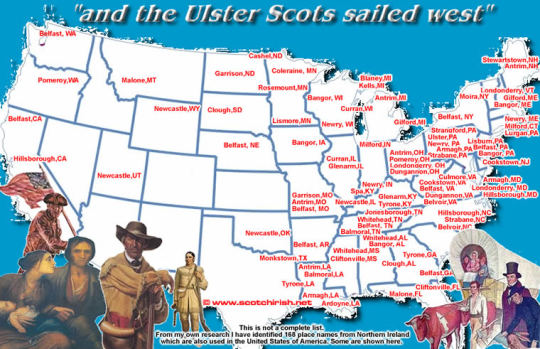
Richard Grant p. 119 - 129 - an interesting history of the migration of Ulster Scots to America in 18th century, arriving en masse in Pennysylvania in the 1720s, much to the consternation of the founding members of the community, the Quakers.
The map above pinpoints some of the place names in America that originate in Ulster.
Source: Ulster Connections blogspot.
3 notes
·
View notes
Photo
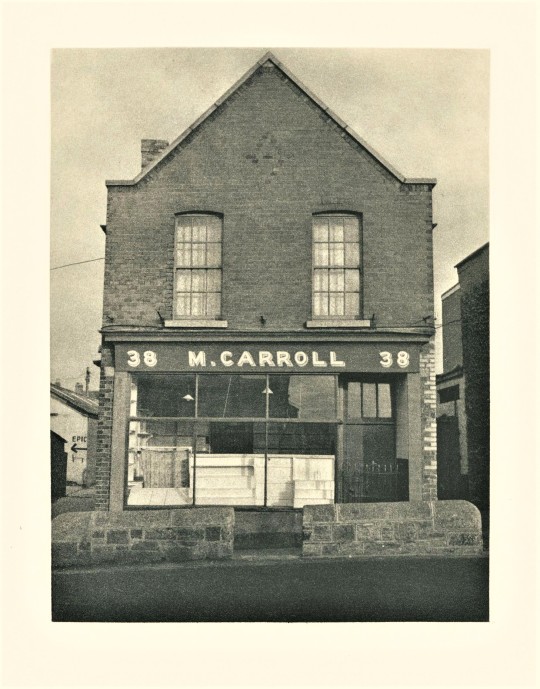
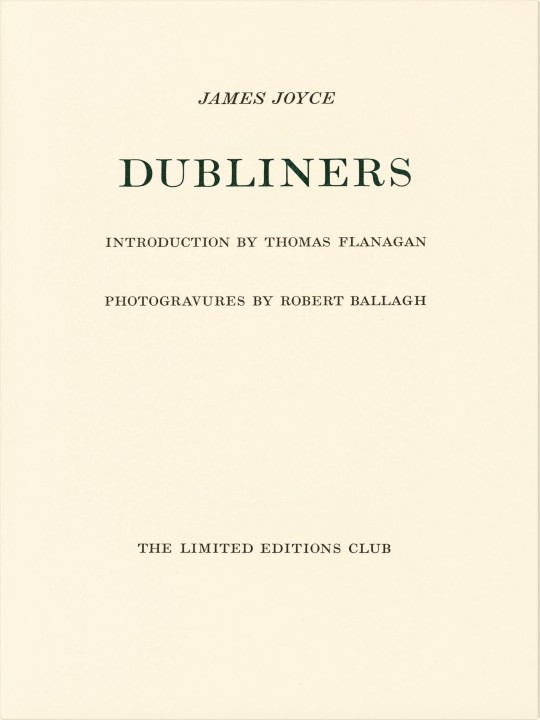
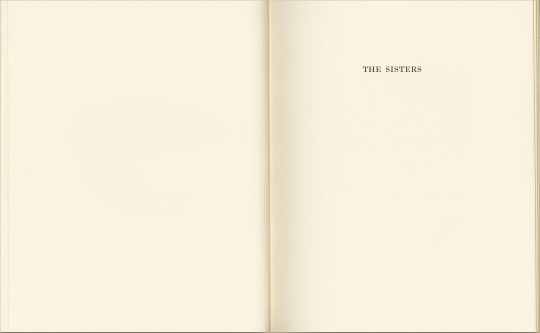
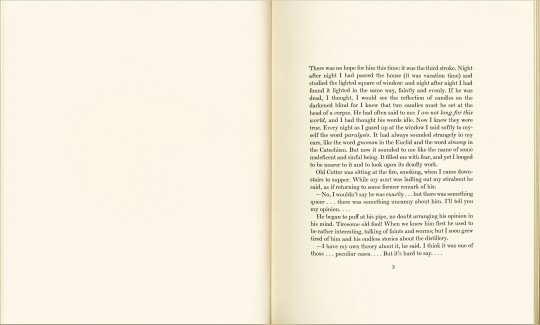
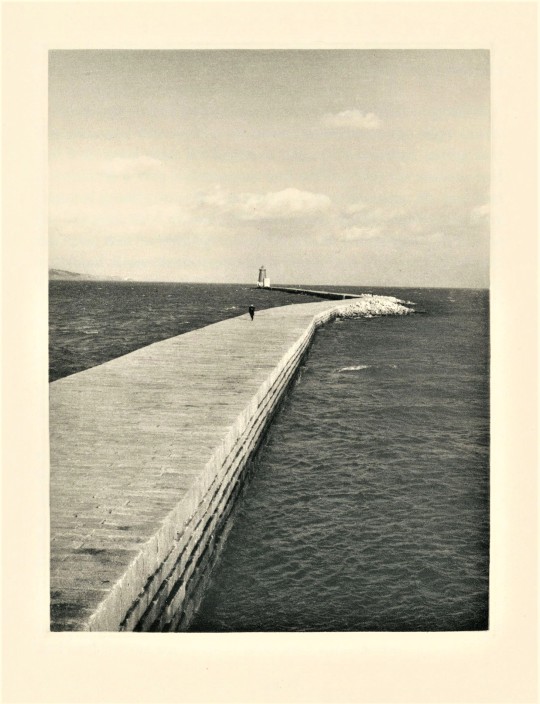

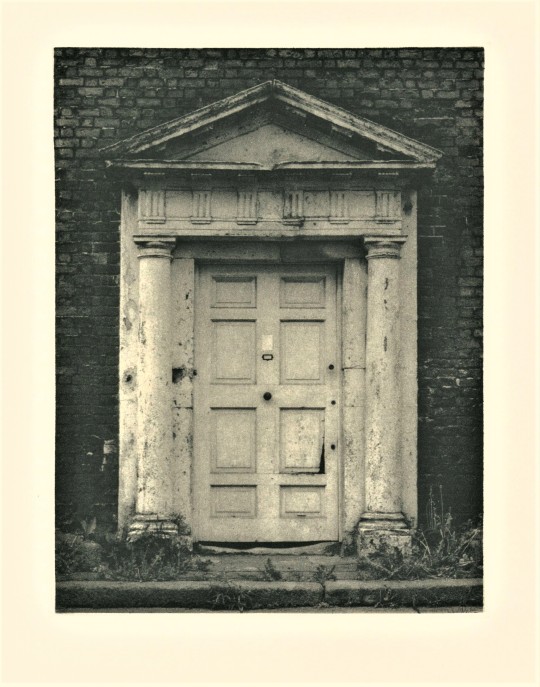
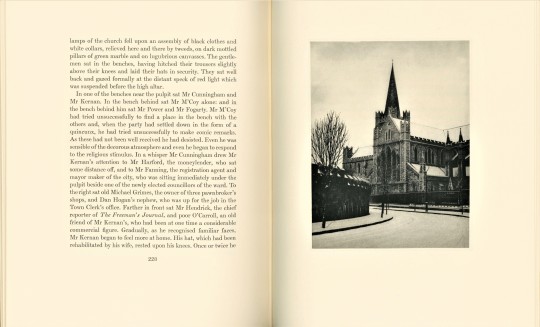
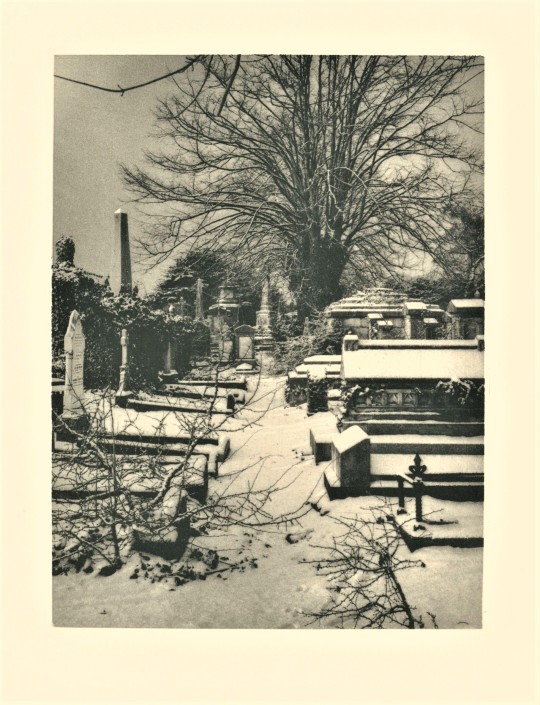
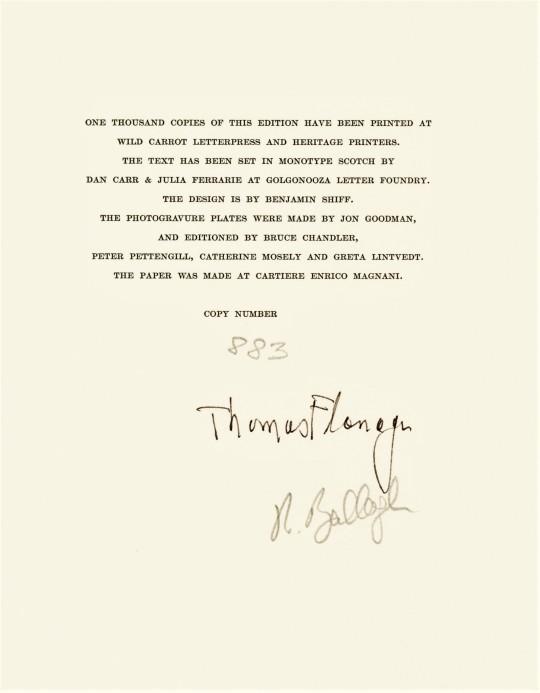
It’s Fine Press Friday!
This copy of James Joyce’s, Dubliners, with introduction by American academic Thomas Flanagan and photogravures by Irish artist Robert Ballagh (b.1943), was published in 1986 by the Limited Editions Club (LEC), New York, in an edition of one thousand copies signed by Flanagan and Ballagh. It was in 1905 that Joyce first took his manuscript to a publisher, although he had a lot of difficulty finding someone to print his book. After many rejections a publisher accepted but demanded changes, resulting in the termination of their agreement. This drama continued for years until the book was finally published in 1914 by Grant Richards Ltd., London.
Dubliners is a collection of fifteen short stories that is a portrait of Dublin during a time when Irish nationalism was at its height. Joyce used his own family, friends, and acquaintances to depict the people of Dublin “in all their uniqueness, their generosity, and love of music, as well as their moral confusion and psychic paralysis” (LEC Letter number 547). This psychic and moral paralysis stems from the long history of Ireland’s subordination to British rule.
Robert Ballagh was born and raised in Dublin and shares Joyce’s fascination with his city. His six photogravures express the sense of isolation and paralysis that exists within the stories. They are velvety and still, and rest alone in the center of the page. They themselves are isolated by the many pages of text that exist between it and the next image.
The type design also illustrates a sense of isolation, with each short story beginning with a title in a single line on the right resting in the expanse of an empty page spread, and after turning the page, another blank page, and opposite to it the beginning of the text with no header, but space for one.
The type was printed at Wild Carrot Letterpress and Heritage Printers. The text was set in Monotype Scotch by Dan Carr and Julia Ferrari at Golgonooza Letter Foundry. Benjamin Schiff, son of then LEC owner Sidney Schiff, designed the book. The photogravure plates were made by Jon Goodman and printed by Bruce Chandler, Peter Pettengill, Catherine Mosely and Greta Lintvedt. The paper was made at Cartiere Enrico Magnani. The book was hand sewn and bound at the Jovonis Bookbindery in West Springfield, Massachusetts. Our copy is a gift form our friend Jerry Buff.
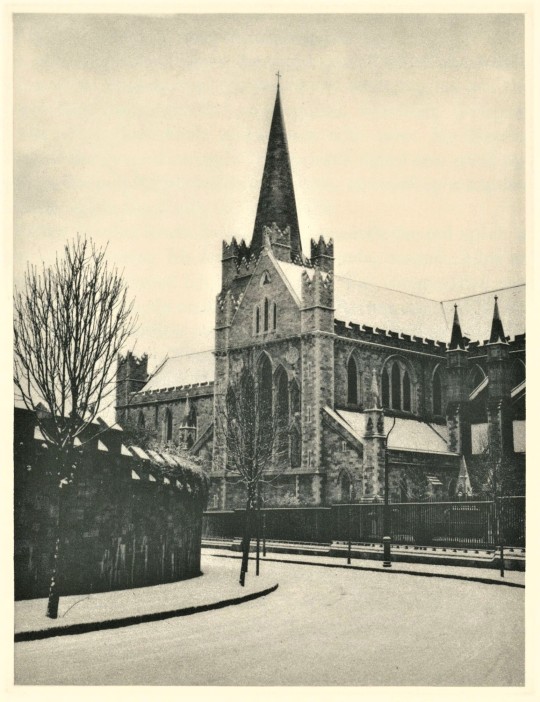
View more Limited Edition Club posts.
View more Fine Press Friday posts.
– Teddy, Special Collections Graduate Intern.
#Fine Press Friday#Dubliners#James Joyce#Irish Literature#Ireland#Dublin#Fine Press Fridays#LEC#Limited Editions Club#fine press books#Photogravure#Printmaking#Intaglio#English Monotype Scotch#benjamin schiff#Thomas Flanagan#Robert Ballagh#Wild Carrot Letterpress#Golgonooza letter foundry#teddy#Heritage Press
58 notes
·
View notes
Text
The temperance movement and the associated politicians needed to control the country’s view of women. It was difficult for a churchgoing America to comprehend mothers and grandmas strapping flasks to their inner thighs or toting revolvers to protect a truck full of hooch. Prohibitionists wanted citizens to believe good women made apple pie and tucked their children in bed at night.
Whiskey Women: The Untold Story of How Women Saved Bourbon, Scotch, and Irish Whiskey, Fred Minnick
#books i read in 2024#whiskey women#Whiskey Women: The Untold Story of How Women Saved Bourbon Scotch and Irish Whiskey#Fred minnick
7 notes
·
View notes
Text

14 notes
·
View notes
Text
youtube
My youngest son came home today
His friends marched with him all the way
The flutes and drums beat out the time
As in his box of polished pine
Like dead meat on a butcher's tray
My youngest son same home today
My youngest son was a fine young man
With a wife, a daughter and a son
A man he would have lived and died
Till by a bullet sanctified
Now he's a saint or so they say
They brought their saint home today
Above the narrow Belfast streets
An Irish sky looks down and weeps
On children's blood in gutters spilled
For dreams of freedom unfulfilled
As part of freedom's price to pay
My youngest son came home today
My youngest son came home today
His friends marched with him all the way
The flutes and drums beat out the time
As in his box of polished pine
Like dead meat on a butcher's tray
My youngest son came home today
And this time he's home to stay
+
[I was about to post this piece when I heard the news of Ben Zussman's death. So, posted that instead. Now, here's this. I hope this war ends soon, so I can get back to writing about other things. Working on my novel. But this is where I am. So this is what I write. Also, if you read it all and decide to share, please paste Abu Saif's essay into the first two comments on your post as I do below.]
I'm pasting in the first two comments an essay from the NYT by عاطف ابوسيف(Atef abu Saif). I’m violating the paywall because it's so important and you might not have a subscription. Sue me. If you manage to read the title and can continue, read all the way to the end. If I believe in the idea of sin, I believe it is a sin to look away. I began to write an introduction, but it turned into something longer. A lot longer. The longest post I’ve ever written. So, feel free to skip my meandering and oh so sentimental musings and read the essay. In any case, I urge you to read his essay. More than that. I dare you. Especially if you support this war.
This post will be difficult for some to read. It sure as hell was difficult to write. There’s complexity here if you recognize the horrors the IDF is perpetrating in Gaza. Even if you, unlike me, stand with those who think them necessary and justified. It’s not simple to write then. But if you make your way through it and then read the essay in the comment, maybe you’ll understand something better. Though perhaps not more sympathetically. Just maybe a bit better.
I’m between the hammer and the anvil with regard to the IDF. I’m in no way an apologist. I’ve been clear with my son that I would support him if he refused. There’s no chance of that. But I wanted him to know. I’ll write something else about that later. These are issues about which I will repeat myself.
But I also reject that people serving in the IDF are like Nazi stormtroopers, or the majority of those serving in it are the equivalent of Hamas, even though I have friends I deeply respect who have presented me with those opinions explicitly. I hope that they are able to read this. It’s again about my children, as Abu Saif’s is in large part. War, for me, is always about children. Always. And, as I wrote last week, maybe if we all recognized that, there wouldn’t be more war.
We should all listen to Eric Bogle’s song “My Youngest Son Came Home Today” more often. Especially the rendition here by the PS22 chorus.
My three children came to me for Shabbat dinner this past Friday. We're all still getting used to the divorce. One meal with me, one at home with their mother, a 20 minute walk from my place. Sometimes, it’s dinner with me and lunch with her. Sometimes vice versa. Once in a while, all five of us together. Their mother sees them more on Shabbat. It’s the nature of things. That’s their home. I see them for two hours. Precious hours. But I see them.
We generally have a very nice time. But even when not, I’d rather have a horrible time with them than a wonderful time with anyone else. They are never eager to walk those 20 minutes, as much, I think because of what that time and distance represents as the effort required to make the short trek. Sometimes one or more of them arrives grumpy. They are teenagers, after all, in the wake of a domestic disruption. But usually, even then, things loosen up. I make food they like. I make sure things are clean and orderly and calm. That things feel stable and safe.
Finally, in the past few weeks, I have prevailed on them to enter without knocking. “It's your father's home,” I tell them. “You don't need to knock to enter your father's home. You aren't guests. You have a place here. Always.” I don’t know if it makes a difference to them. But it does to me. I hate it when they knock. They’re my kids.
I only see my elder daughter on Shabbat. She was recently inducted into the education corps for her compulsory service. (The army aspires to be a source of knowledge for people who have been deprived.) She began her service just a few weeks before October 7th. A member of her course was from Kibbutz Beeri. He was home for Shabbat and caught up in the massacre. Even in the education corps, one may be connected to the dead.
But she’s nowhere near any danger. She says she’s a bit embarrassed when she’s in uniform on the street, or on a bus, and people bid her “watch over yourself”. Or “May the Name guard you.” I tell her she’s a member of a corporate body that puts itself in danger to keep them safe, even if that’s not her posting. They are wishing her well because they need to wish all of our soldiers well. Because, often, they can’t wish family members and friends and friends’ children well at that moment. They need to say it. For themselves. And she provides them with an occasion. A sort of gift she can give them. Also, I want everyone to bless my children. To wish them safety and protection. To want their wellbeing. Who wouldn’t?
Sometimes, the one who gives the blessing benefits more than the one who receives it. Every Shabbat when I see them, before we eat, like many Jewish parents, I move from one to the next, in order of their birth, place my hands upon their heads, and recite the tripartite priestly blessing from the Book of Numbers. Three blessings in one. An ancient bargain!
May The LORD bless you and guard you.
May The LORD shine His face upon you and grant you favor.
May The LORD raise His face to you and grant you peace.
My favorite moment of the week. Routine, a formula, but never formulaic. The regularity never diminishes its emotional charge. They are often distracted or bored or grumpy. Though when he was little, my son, who was born with a galaxy-sized heart – when he was two, one of his caregivers told us “he’s simply full of love” – would respond by putting one hand on my head and one on his mother’s. And we would grin and sometimes giggle a bit. And feel blessed. Even when I’m irritable or tired, blessing them always redirects me toward meaning, if only for a moment.
I remember the first time I did this. In a hospital recovery room. Their mother looked up at me, tired beyond tired, and said “should we give our daughter a b’rakhah?” A blessing. We’d been preparing for nine months. In some senses longer than that. Since we were engaged and hoping to give one another children. So, I’d been waiting for the right moment, and I was about to say something. Our daughter had been born on Friday morning. We’d lost track of time. The labor had been so long, and the delivery had not been easy. But Shabbat, commencing with sundown, pulled us back on schedule. We always measure time from Shabbat to Shabbat. From that moment on, I would measure it from blessing to blessing.
I had been about to say something about it being time. Our first time. But she preempted me. It was right for her to claim the prerogative to prompt us. Earned. Childbirth is never egalitarian. And despite the long anticipation of this moment I’d imagined, even dreamed, the substance of its performance, the special mix of gravity and joy, the glow of it felt surprising. We’d placed our fingertips on her small, warm, downy head. So delicate. So fragile. With barely any pressure. She was in a deep sleep. Being born is very hard work. Especially when it takes so long. In a matter of weeks, if not days, we’d be longing for her to finally sleep. So, we could collapse or work or read or watch TV. Mostly collapse. But at that moment, I wanted her to be awake. I wanted her to hear us. I wanted her to watch us and feel our hands upon her, blessing her with a wish of peace. Shalom. A more expansive term than peace that also connotes health and fullness and well-being. A blessing that channels something beyond language, something language can only summon but not contain. I wanted her to feel it. I remember crying a little. I think I did. I hope I did.
I wonder how Atef Abu Saif blesses his children.
I don’t connect so much to the idea of a “personal God.” Sometimes I wish I did. I wish I had an almighty and benevolent addressee who would hear me. “Nigh is The LORD to all who call upon Him,” as the psalmist says. But I’ve never really felt it. That presence. I’ve studied some theology. A body of knowledge I admire. I wrote my Bachelor thesis on Maimonides’ reading of Job in his Guide of the Perplexed. A dazzling text that I never found as cold as some find its rationalism. Rather, it’s literary and bold and charged with a kind of passion, with humanity, even as the author, that monumental Sage and philosopher strives to distinguish God absolutely from anything human. A deity so far beyond humanity that ascriptions of physicality to him in scripture must be read strictly and scrupulously as metaphors. Yet his text sings with humanity. I’ve studied mystical theologies as well. They have moved me in similar fashion. Though a different flavor.
But despite all the humanity in theology, I’ve never felt that immediacy of touch or attention or found the arguments compelling enough to engender belief in God’s objective existence (and now the RaMBaM, the acronym by which we refer to Maimonides, is shouting in my head that God is not an object, and the idea of His objective existence is idolatrous). Yet if God is so elusive for me personally, I still find the conceit powerful. Imputing a name and a face to the Cosmos, with apologies again to the RaMBaM, whether or not it’s an intentional power, is very alluring. So, in that hospital room, my fingers timid on that little head, the regularity of my hours-old daughter’s breathing so miraculous, we pronounced the ancient formula. Please God, let her be well. Let her be whole. Let her have peace. And then we had a son. And then another daughter. Each a blessing. And every week I bless them.
So, once again, this past Friday night I blessed them. Let them have peace. Shalom. Wellbeing. Let everything be well with them. I know it won’t always be. There will be struggles and illnesses and disappointments. Maybe heartbreak. Certainly heartbreak of some sort. I’ve had more than my fair share. Not only recently. Atef Abu Saif, whom I hope you will read below, has had more. Much more. Hard to imagine any Gazan who hasn’t. There are so many kinds of heartbreak. It’s endemic to humanity. To life. Only a babe who dies very shortly after birth never knows heartbreak. Not to know heartbreak seems inhuman. “Nigh is The LORD to the brokenhearted,” says he psalmist. But nonetheless. Please spare them that. Please. When I bless them, I want to feel power flowing through me, pouring out of my hands onto them. Enveloping them in radiance. I want to be a conduit for divine favor. Let God’s face recognize them, let them be seen by the Cosmos, and be received in kindness, and receive kindness. As I said, giving a blessing can be more for the one blessing than for the blessed.
This Friday night, they barely broke their chatter when I went around to bless them. As usual. I did it quickly. I usually do. But it never undercuts the profundity of it. And like many parents, I kissed the tops of their heads as I removed my hands. My son, who recently surpassed me in height by a few centimeters, now bends his head down so I can do this.
These days, that final word in the mystic formula, shalom, feels particularly powerful, particularly heavy. Even more than usual. Despite its range of abstract meanings, it always feels so specific and concrete as their heads round into my palms. And I stand in a posture of power. The ultimate patriarchal pose (though, of course, many women, like their mother, do it as well). But perversely, it makes my powerlessness palpable. I won’t be able to preserve them from suffering and deprivation and disappointment. I have, myself, presented them with such experiences already. It has been a difficult few years. And as my yearning for power underscores my powerlessness, the blessing becomes a plea. Please. Bless them with peace. Please. Please. Please. Always. But especially now. Shalom.
My daughter had told me earlier that day that because of “the situation”, they are going to start sending members of her unit home with rifles when they set out for their near weekly Shabbat furloughs. I think it's ridiculous. She’s in the education corps. It seems both thematically incongruous and useless in a practical sense for her to travel with a semi-automatic assault rifle. A machine gun. I tell her she’ll never use it. And she shouldn’t. The only place she might do so would be if “something happens” on the way. But fifty more visits to the shooting range wouldn’t equip her for that situation. Excellent field soldiers sometimes fail to pass anti-terror training, teaching people how to use a weapon in the middle of an attack in a civilian area. Though we send armed soldiers into civilian areas right now. We always have and we always do. But those aren’t ‘our’ civilians. Aren’t we supposed to hold every human life as equally sacred? We claim to. We don’t. Obviously. No army does. Laws and ethics of warfare don’t. But that doesn’t make it ok.
She mentions the attack that happened the previous day. Two Palestinians from East Jerusalem opened fire on a bus stop at the entrance to West Jerusalem. And two soldiers and one civilian shot them dead. Three civilians died. Four, actually. I’ll get to that in a moment. Several are in the hospital. I admitted that maybe then. If she had a clear shot. But that’s crap. The presence of mind to operate a weapon under pressure without extensive training? I imagine her quickly swinging her rifle around to the front of her body, quickly inserting a magazine, cocking it, bracing the butt against her shoulder, aiming, finding a clear sight line, and pulling the trigger. All while under fire herself. Yeah. That’s not happening. She should get herself behind a very solid object or lie flat on the ground with her hands over her head.
Then my son mentions that one of the people who was killed, the fourth, had jumped from his car and it was he who shot the terrorists. A 38-year-old lawyer named Yuval Kestleman who served in a reserve combat unit and carried a licensed handgun. I saw the security footage. As the two off-duty soldiers had turned and trained their weapons on him, he'd dropped his gun, sunk to his knees, ripped open his jacket so they could see he wasn’t wearing an explosive belt, all the while calling out to them in Hebrew, identifying himself as a Jew and an Israeli. And one of the soldiers, a member of the radical right-wing settler “hilltop youth” who was on his way back to Gaza, shot him dead.
There’s a controversy over whether the soldier who shot him can be excused. Part of a broader controversy about what constitutes a “neutralized” suspect or perpetrator and the ruled of engagement. Some, like the awful Chief Rabbi of Safed, explicitly support summary executions. Even if they are lying unconscious. Just shoot them. The ideological community this soldier affiliates with holds this position. And if you get it wrong, well, as our Prime Minister initially said about this incident, “that’s life”. Really.
I don’t know the soldier. Just his ethos. And he expressed glee at having killed someone, at least before he found out whom he killed. “Everyone wants an ‘x’.” A kill. A lie. Many if not most hope they never have to. But he did. It’s hard for me to believe he couldn’t see Yuval Kestleman drop his weapon, fall to his knees, and raise his hands over his head, hear him calling out in Hebrew.
I’ve already argued about it with one total stranger, a security guard at a building I was entering, holding forth with another security guard about the case. I couldn’t help myself. “You don’t fire at someone if they are on their knees with their hands above their head.” He responded with “and what if it had been a terrorist?” I repeated that you don’t shoot someone on their knees with their hands over their head. And the footage is quite clear. My daughter would never do that, even if she could get in position to do it. My son wouldn’t. None of their friends would. I can’t imagine any of he people I served with doing that. Though it’s been a long time. Maybe some would. Certainly not those I trained and commanded. But we send lots of people like this soldier and this security guard to Gaza. And sometimes people like Atef Abu Saif and his son and his mother face soldiers like these.
My son is 16, a year old than Atef Abu Saif's son, about whom you will read below, if you have the courage to witness. You should try. The act of witnessing is a sacred act. And sometimes, it’s all we can do. I know that telling people what they should do is both strategically and morally a sketchy thing. Lots of things these days are strategically and morally sketchy. I suppose it will be much easier for those who don’t live here, haven’t served, don’t have children serving in Gaza, or know children of friends serving in Gaza, or have neighbors serving in Gaza, or. . .well basically almost everyone who lives here. Barring ultra-Orthodox and Arab communities. He’s an elite athlete, a student at an academy for dedicated and ambitious and highly disciplined basketball players located 40 minutes from Gaza, much closer than his older sister’s army base.
My youngest is 13, the only one who lives with their mother full time. I see her once in the middle of the week as well. She comes for dinner. Or we go out. We always have fun. Last week, I made a pasta she loves, and we watched The Godfather. She shares much more with me now than she did when I lived with her. And I feel guilty that her mother shoulders most of the hard parenting bits, though we both try to share those as well. Some things are overdetermined by the physics of space and time. And sometimes a distance of 20 minutes might as well be 500 kilometers.
At some point, as was inevitable, the conversation shifted to “the situation”. My son says he believes this war is necessary. That it will make us safer. That the civilians dying in Gaza, with whom he says he sympathizes, are all Hamas' fault. ‘Look what they made us do!’ He says his opinions have changed since October 7th. I think that's Hamas' fault. His older sister says she trusts the army that they are doing everything they can and know what they are doing and she thinks we must all have faith in its commanders. She’s very firm about this. Too firm? Does she really think this? Or does she need to believe it? They have friends serving in Gaza. They know people who were murdered on October 7th. They know someone who is being held hostage.
My youngest offers that for every Hamas member we kill, we make three more. A common saying among war skeptics and opposers. Maybe she heard it somewhere. Maybe the formulation is obvious. Maybe she uses the number three because our minds so commonly divide things into threes. Lots of theories about that. Aristotle, in his Poetics, says all stories must have a beginning, a middle, and an end. We invoke the names of three patriarchs in our liturgy. It takes Abraham and Isaac three days to reach Moriah, where the former, a father, binds the latter, his son, on an altar and raises a knife over him. Three blessings make up the blessing I bestow upon them every Shabbat as a plea for their shalom, their wellbeing. Three bears. Three pigs. Three caskets in Shakespeare’s Merchant of Venice. Some say you surface three times before you drown. Like Emily Dickinson.
Three times, 'tis said, a sinking man
Comes up to face the skies,
And then declines forever
To that abhorred abode.
Kill one and make three, she says. I say I agree with her. I tell them that I don't believe that the situation you will read about, if you dare, in Abu Saif’s essay below makes us safer. It's at best a strategically and morally sketchy endeavor. A sketchy calculus. And suddenly I realize how calamitously insufficient the word sketchy is here.
I don't say much more to my elder daughter and son. It won't help to argue and correct them. And they already know my politics. It’s one of the reasons they are unloading on me. Sometimes they are uncomfortable with how far outside the mainstream I am. Sometimes they are confused by my orientation and commitments. It's not easy to have a parent so far outside consensus. A member of a dissenting minority. Who sometimes even dissents from the dissenters. They want to belong. They want to feel at home in their social world, their society, their culture, their history, their people. I used to want that. Sometimes I still do. I have friends with activist children. Mine are not. I don't know why they aren't. Maybe it’s a parenting failure. I haven't always been as stable and present a parent as I intended and always wanted to be. I had serious struggles. I’m better now. Much better. And there’s no deficit of love between us. But I obviously failed to present them with a compelling model for engagement the way I would have liked.
So I let them unload their fear and anger. Posing a question here and there. Offering a brief comment that I strain to phrase in a way that isn't argumentative. I'm not good at that, so I stay mostly quiet. They know what I think. And they are speaking with that knowledge. Fighting with them won't help. They are in the middle of a crisis. Their trauma is unfolding. Though not like Abu Saif’s son’s trauma. Nowhere near that.
I noted that my son was now standing on his feet. I was distressed at the turn it had taken. For selfish reasons. These hours are indescribably precious to me. I want them to be pleasant. But this, too, is part of parenting. A part I don’t want to miss. There were stories and laughter. Sometimes, even my stories and their laughter. With no accompanying eyerolls. I have some talent for telling stories. But when they began to unload, I reminded myself: say less, listen more, as their mother would often urge me with extreme exasperation. If I had been able to do that, would they be coming with me to rallies and demonstrations? Or, the deeper question, would they be splitting their Shabbat meals between me and their mother now?
We moved onto the blessings after the meal. As always, we prefaced them by singing Psalm 126. ‘He goes forth weeping, the planter bearing his store of seeds; come, he will surely come back in joyous song bearing sheaves.’ Tell that to the loved ones of the victims on October 7th. What about all the kids whose lives were cut short like sheaves, before they could plant their own seeds? Still, I sang with them. Then, this morning, I read Atef Abu Saif’s essay. Tell that to him. I dare you.
+
https://www.nytimes.com/.../gaza-family-palestinian...
And listen to "My Youngest Son Came Home Today"
+
‘I Want to Be Awake When I Die’
Dec. 2, 2023
[Atef Abu Saif was visiting family members in Gaza with his 15-year-old son, Yasser, before Oct. 7 and has kept a diary of the war since it began. Here is his entry for Nov. 21, the day he decided to leave the Jabaliya neighborhood in the north of the territory for southern Gaza, en route to the Rafah crossing into Egypt.]
We cannot stay here any longer. We have decided.
The shells over the last two nights have been so close to the apartment we are staying in that I didn’t just see the light and hear the thunder of their explosions. I saw them pass right by my window. The Israelis are getting closer every minute. Most of the outer regions of the camp are under full occupation now. Overnight, troops advanced a couple of streets closer from the north. Our street came under continuous shelling from the tanks.
I never closed my eyes. “I want to be awake when I die,” I told my brother Mohammed, who has been with us for most of the war. “I want to see it happening.” Before going to sleep, my son Yasser said he felt more afraid than ever. For the last 45 days, he has shown great strength in the face of everything, but we all have our limits. “Let’s see,” I told him. “In the morning we’ll decide.”
This was two nights ago. So, yesterday morning, I went to see my dad to ask if he’d consider moving with us. It was a hard “no.”
“But most people have left already,” I said. He’s staying put, he insisted, come what may. Then, as I was leaving he shouted back to me: “Get that boy to safety.”
That helped convince me. As I lay on my mattress last night, I realized it was not fair that my 15-year-old son should pay for my decision to come to Gaza and stay so long in the north. He might have survived 45 days, but would he survive the next 45? The chances of escaping death are growing narrower and narrower. I do not have the right to decide for him. In her last call to me from our home in Ramallah, on the West Bank, my wife, Hanna, said simply: “I want my boy. You took him to Gaza. You bring him back.”
Talk of a truce fills the news, and this might be a good time to head south to Rafah and be near the border with Egypt in case it opens. I have a job in the ministry in Ramallah to get back to, after all.
The sight of the shells flying past my window the night before also made it clear that it was time to leave: sometimes it is better to be wise than correct, if that makes sense. The wise thing is to give everyone a chance to live, even if the correct thing is to not let the Israelis get away with a second Nakba — yet another expulsion from our land.
When this morning finally comes, the driver we have hired for the first leg of our journey arrives. My father-in-law Mostafa and his wife Widdad, who uses a wheelchair, are traveling with us. My in-laws want to stay with their granddaughter Wissam, 23, at the European Gaza Hospital in Khan Younis, in the south. Wissam is recovering from triple amputation surgery, after surviving a bombing in the first week that killed her parents and most of her siblings. Wissam’s surviving sister, also named Widdad, can take care of her grandmother as well as Wissam.
I carry my mother-in-law into the car. As the car sets off, we all try to prepare ourselves mentally for the long journey ahead. We get out at the Kuwait traffic junction and negotiate the hire of two donkey carts to carry us all to a gathering area along Salah al-Din Street, the main north-south route already called “New Nakba Road” by some.
#Scotch/Irish folk song#singing#songs#Ori Hanan Weisberg#words and writing#Israel Hamas war#anti-war#human#humanism#humanity#Youtube
6 notes
·
View notes